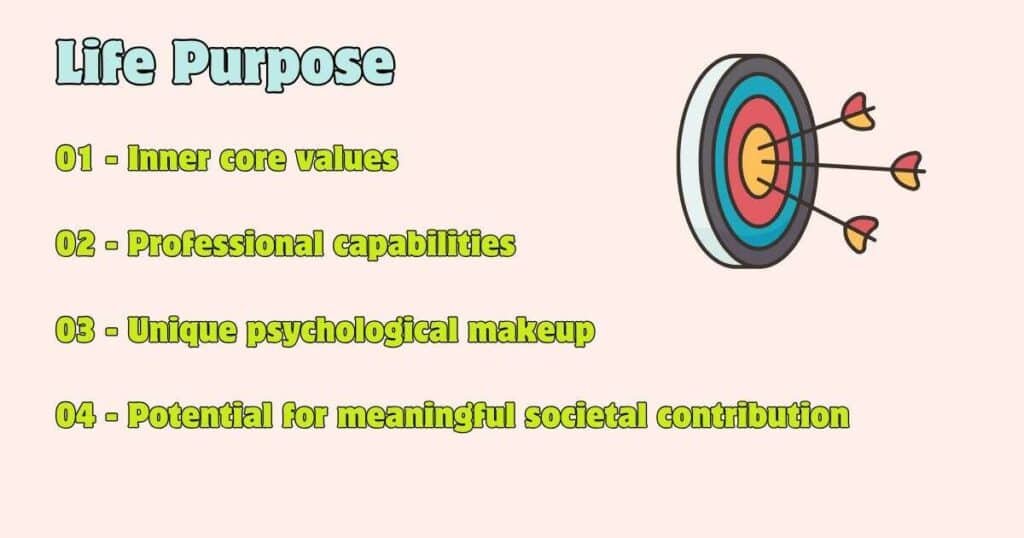Feeling stuck at a crossroads, unsure how to turn dreams into reality? How do you work with a coach to define purpose?
A mentor can help bridge the gap between where you are and where you want to be.
Purpose-driven coaching offers clarity and direction, transforming aspirations into meaningful action.
Finding your true purpose is a luxury. Studies show that people who engage in purposeful coaching are 3.4 times more likely to report high levels of career satisfaction and inner peace.
This comprehensive guide will walk you through a proven approach to uncover your purpose.
Understanding Purpose and Coaching

Life purpose is far more than a career milestone or a catchphrase in personal development literature. It represents:
Inner core values
Professional capabilities
Unique psychological makeup
Potential for meaningful societal contribution
Purpose is a powerful feeling that comes from a mix of different parts of our psychology working together. At its root, purpose is inspired by innate desire—a deep sense of satisfaction that doesn’t rely on external rewards.
It’s about dedicating yourself to what genuinely appeals to you, connecting your passions and values to the direction of your life.
The Self-Determination Theory provides further insight into the psychological mechanisms of purpose.
It highlights three essential factors: autonomy, competence, and relatedness. Autonomy gives people the power to take charge of their choices, while competence builds confidence in their abilities.
Relatedness adds another layer by linking personal experiences to the bigger picture, helping individuals feel deeply connected and engaged with the world around them.
Modern research from areas like positive psychology, neuroscience, and organizational behavior shows that purpose isn’t fixed; it’s a dynamic and evolving concept.
Comprehensive Purpose Dimensions
1. Personal Fulfillment
Life purpose starts with feeling good about what you like. When your actions match your values, you feel more at peace and true to yourself.
2. Professional Expression
Purpose also shines through meaningful work. You use your talents in careers. You grow and reach your full potential. You changed and become the best version of yourself.
3. Social Contribution
The purpose isn’t just personal. You can create positive change and support everyone’s well-being.
4. Holistic Integration
Personal passions, professional goals, and social dimensions together create a flexible framework for a meaningful and ever-evolving life purpose.
Emerging Trends in Purpose Discovery
Technology integrates advanced digital tools for enhanced insights and better support.
AI-driven tools use smart algorithms to study behavior and thinking patterns. It uncovers growth opportunities that traditional methods might miss. It can offer tailored guidance to help you grow.
Neuroscience technologies, like brain mapping and cognitive pattern analysis, offer accurate insights into how the brain works.
Personalized interventions are designed based on each person’s unique brain and psychological profile. It confirms growth plans and efficiency that are both scientifically proven and adaptable.
The combination of AI, neuroscience, and data analytics is changing the way we think. It’s moving from one-size-fits-all methods to tailored, precise development plans.
Preparing for Your Coaching Journey

Selecting the Right Coach: A Critical First Step
Choosing the right coach is like picking someone who can guide you.
The right coach is more than just experienced—they understand human potential and can help you explore your true self.
Picking the right coach means trusting your gut, doing some research, and being open.
The best coach will ask the right questions, challenge your ideas, give honest feedback, and make you feel safe to explore who you really are.
Qualifications and Credentials Explained
Professional coaching has become a specialized field requiring extensive training and expertise.
Credentialed coaches, like those from the International Coach Federation, use research-based methods and advanced psychological and neuroscience insights to guide personal transformation.
When choosing a coach, look for those who offer a holistic approach, not just certifications.
Self-Reflection: Preparing Your Internal Landscape
Self-reflection prepares you for change. It’s not about criticizing yourself but about understanding where you are in life with honesty and compassion.
Personality assessments, values exercises, and journaling help you map out your inner world.
Your coach can turn the coaching experience into a custom strategy instead of a generic solution.
Setting Realistic Coaching Expectations
Purpose coaching is a collaborative process requiring commitment and clear communication.
It’s not about quick fixes but about gradual progress. Expect challenges and shifts.
By setting goals and staying accountable, you create the space for real transformation.
Purpose coaching is an investment in yourself, with benefits that go beyond money.
Effective coaching usually takes 3-6 months of steady work.
People also read:
Mastering the Leadership Ladders: Unlocking Career Growth and Success
What is Productivity and How Can It Improve Your Life
Overcoming Challenges in Purpose Discovery
Purpose discovery is rarely a linear journey.
Most people face mental and practical challenges that hinder their journey to self-awareness.

These common challenges are:
1. Imposter Syndrome
Imposter Syndrome makes people doubt their success and fear being seen as frauds, even when they’ve earned their achievements.
It often comes from perfectionism, high expectations, or comparing themselves to others.
Reframe your thoughts, track your progress, and seek external feedback to validate your skills, recognize success, and embrace your potential.
2. Fear of Uncertainty
Fear of uncertainty keeps people confined to their comfort zones. It prevents them from pursuing meaningful changes and growth opportunities.
Rooted in past setbacks, fear of failure, or societal pressures, it often leads to indecision and stagnation.
Take small risks, try new things, and see uncertainty as a chance to grow and learn.
3. Limited Self-Perception
Limited self-perception stops you from realizing your full potential.
It may stem from internalized narratives, societal stereotypes, or past failures.
Reconstructing personal narratives, learning from challenges, and using visualization can build confidence and unlock untapped potential.
4. Navigating Psychological Barriers
Overcoming psychological barriers requires compassion, strategy, and resilience.
Journaling, mindfulness, and coaching help slowly overcome obstacles.
Practical Challenges in Purpose Discovery
1. Time and Resource Constraints
Personal growth with daily life can be tough due to busy schedules, finances, and family.
Proper time management balance priorities and make space for growth.
Digital platforms, flexible learning, and affordable online courses make development easier and more accessible despite life’s challenges.
2. Strategic Mitigation Approaches
Online learning let people grow at their own pace.
Affordable options like hybrid coaching and free resources make personal growth accessible to everyone.
It also fits into their lifestyle and budget.
3. Motivation Maintenance
Regular check-ins, visualizing progress, and setting milestones turn big goals into small, achievable steps.
Building a supportive community also keeps people inspired, offering accountability and encouragement to maintain momentum.
4. Navigating Challenges Holistically
Customize approaches that respect your limits and encourage growth. You can keep progressing despite obstacles.
Novel Tactics
- Holistic integration techniques understands that a comprehensive, interconnected approach brings growth, not isolated steps. It blends personal reflection, professional guidance, practical experience, and constant adaptation.
- Personal reflection is a space for deep self-examination and authentic introspection. It includes mindfulness, structured self-dialogue, and a clear understanding of your inner world. Professional guidance provides an external, objective perspective with expert insights, structured methods, and evidence-based frameworks that challenge and support personal insights. Practical experimentation links internal understanding with external validation, helping individuals test their purpose through real-world experiences and actions.
- Continuous adaptation recognizes that purpose is an evolving path, not a fixed destination. It embraces uncertainty and change. It views personal development as a fluid process of growth, learning, and adjustment. You can refine your sense of purpose and adjust to life’s changes.
- The societal contribution angle broadens the exploration. It encourages you to understand the larger context of community and collective impact. Your broader social needs and potential contributions are connected. Inner value alignment is not just externally validated but deeply congruent with your core beliefs, ethics, and sense of meaning.
These methods are comprehensive and flexible and respect each person’s unique experience.
Measuring Purpose-Driven Progress
Quantitative Indicators provide a concrete, measurable framework for tracking purpose-driven progress, offering objective insights into an individual’s professional and personal growth trajectory.
Job satisfaction scores are becoming a key measure. It goes beyond traditional performance reviews to reflect a deeper emotional and psychological connection to one’s work.
Income and career growth are signs of financial success. They also indicate increasing opportunities for meaningful contribution and personal development.
Skill acquisition rate becomes a dynamic indicator of continuous learning and adaptability. It measures the pace and depth of professional and personal capability expansion.
It’s not just about completing courses or earning certifications; it also adds new competencies to your professional and personal toolkit.
Network expansion tracks the growth of connections that can support opportunities and diverse perspectives for ongoing purpose exploration.
Qualitative Assessments introduce a more nuanced dimension to progress measurement, capturing the profound, often intangible aspects of purpose-driven development.
Emotional fulfillment emerges as a critical indicator. It examines the depth of personal satisfaction, psychological well-being, and authentic engagement with one’s life path. Beyond surface-level happiness, it delves into a more profound sense of meaningfulness and resonance with your chosen direction.
Personal energy levels serve as a holistic measure of alignment. Tracking the psychological and physiological indicators of living in harmony with your core purpose.
Alignment with core values focuses on the internal congruence between purpose and lived experience.
This multidimensional framework offers a sophisticated tool for ongoing self-reflection, strategic planning, and meaningful personal evolution.
Conclusion
Finding your purpose is all about learning more about yourself and moving forward.
Purpose-driven coaching can help you navigate challenges, connecting your values, passions, and goals.
Consistency and patience are key to sustaining long-term growth, as purpose evolves with life’s experiences and challenges.
You embrace self-reflection and commitment. You live the life you wished for.
What steps will you take today to move closer to your purpose?